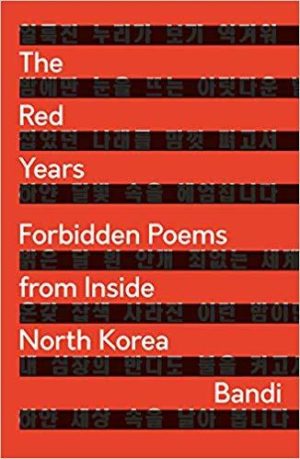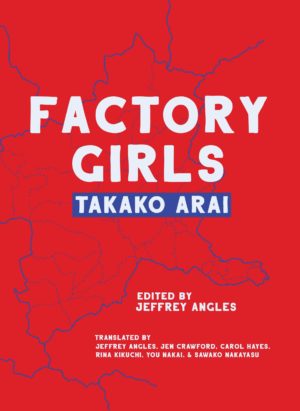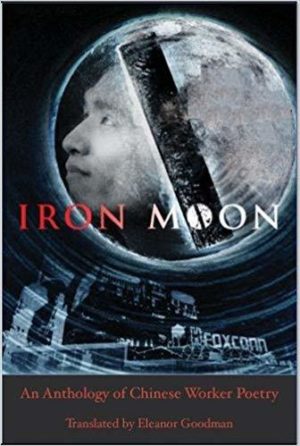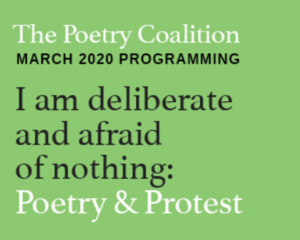Poetry & Protest
The Power of Protest: Three Poetry Collections from Asian Writers

Takako Arai writes, “this is not the work of ghosts.” Throughout these three collections are the poems of ordinary people trying to live their lives, and the living is not easy. Bandi writes poetry in protest of the North Korean government but cannot speak it in his own country. The Chinese migrant worker poets toil endlessly in the cold automation of modern factories, writing poetry in their off-time to give their lives a meaning beyond their economic exploitation. The women in Takako Arai’s poetry weave the silken garments for men in powerful religious positions. Factory work is a feature of both capitalist and totalitarian society, but what they all have in common is the ideology of the factory itself—a site of manufacturing power for the powerful while workers and citizens are exploited. In Bandi’s case he was the factory; writing in North Korean state approved publications until a series of brutal events compelled him to write for himself. These are poems who are no stranger to powerlessness, but they are also powerful in their unique resistances to the sacrifice of self-expression capitalism and totalitarianism demand of people living within their grasp.
The Red Years: Forbidden Poems from Inside North Korea by Bandi (Zed Books, 2019)
Bandi (Korean for firefly) is the pen name of one of North Korea’s most well-known dissident writers. The Red Years: Forbidden Poems from Inside North Koreatranslated by Heinz Insu Fenkl is their first collection of poetry in English after The Accusation, a collection of short stories translated by Deborah Smith. Bandi was born in 1950 and left with his family to China during the Korean War. When he returned to North Korea, he became active in the Chosun Writer’s League Central Committee, writing for North Korean state publications in the 1970’s. After the death of Kim Il-Sung in 1994, Bandi’s writing changed dramatically as he saw friends and family destroyed by famine and persecution. When a relative shared plans on fleeing to China, he gave her a manuscript of short stories and poems. In 2017 The Accusation was published by Grove Press and won the PEN Translates Award, A World Literature Today Translation of 2017, Globe and Mail Best Books of 2017, and longlisted for the Aspen Words Literary Prize. The Red Years was published by the UK press Zed Books in 2019.
Reading Bandi you only get the briefest glimpse of the realities the author struggles with while living under a dictatorship, but the sensitive bravery of individual resistance is woven throughout his careful lyric poems. Their publications wouldn’t be available to the rest of the world if it wasn’t for the great risk Bandi took when trusting a confidante to smuggle them safely out of North Korea, a relative whose real name, like Bandi’s, is unknowable. We have only his work to speak for him:
From the poem “The Red People”
Great Leader, Great Leader,
You are the whip--we are horse and oxen.
Ride us, beat us, to your heart’s content,
Just please, please, do not let us starve or freeze,
And if you heed this one small plea,
We’ll have no fleeting thought of crossing over.
Great Leader, Great Leader
You’re iron chains and we are slaves.
Rope us, bind us to your heart’s content
Only, only, do not plug our eyes, ears, mouths,
For if you heed this small request
We shall never think to turn on you
Factory Girls by Takako Arai (Action Books, 2019)
Factory Girls, edited by Jeffrey Angles and translated by Jeffrey Angles, Jen Crawford, Carol Hayes, Rina Kikuchi, You Nakai, and Sawako Nakayasu is the fourth book by the Japanese avant- garde poet Takao Arai. Arai, born in 1966, she grew up in a small town in central Japan known for its textile industry. Since her father was a manager of a small weaving factory on the family property, Arai spent her childhood observing and interacting with the factory, which employed women workers. With an observant eye, she remembers the women she knew intimately and peripherally, as workers and as fellow rural Japanese women, passing through the skeins of her childhood. The women are very much alive, and their labor the heart of the factory, as Takako Arai weaves poetry from their cyclical beating impressions.
From “When the Moon Rises”
But when the moon rises, it begins to work
Its strange automation
They say that soon after the war
A factory worker’s hair got tangled
In the machines, killing her
There are things that float here
But this is not the work of ghosts
No
In the factory
There are peculiar habits
That is what I mean
Peculiar habits remain here
Iron Moon: An Anthology of Chinese Migrant Worker Poetry (White Pine Press, 2016)
Before the anthology, Iron Moon was known as the name of a documentary about the lives of Chinese migrant workers. Directed by Feiyue Wu, the film debuted at the Shanghai International Film Festival in 2015 to widespread acclaim. Now it’s also known as a groundbreaking anthology of poetry written by migrant workers, edited by Qin Xiayu and translated by Eleanor Goodman. Each poem is introduced with a short bio of each poet’s birthplace and labor history. Within these pages you’ll find poems about machination, feelings of disembodiment from overwork and poverty, dormitories and shanty towns where migrant workers find lodging for temporary jobs in factories and construction sites, workplace accidents, health hazards, and longings for home, family, and better lives.
The namesake of both documentary and anthology, Iron Moon, comes from a line in the poem “I Swallowed the Iron Moon” by Xu Lizhi, who made international headlines when he committed suicide by jumping off the roof of his workplace, a factory owned by Foxconn making Apple products. He is also the author of a posthumous collection of poems, A New Day.“I Swallowed the Iron Moon” is the last poem featured in the anthology to commemorate his life, a rallying cry for future generations of migrant workers.
I Swallowed an Iron Moon
I swallowed an iron moon
they called it a screw
I swallowed industrial wastewater and unemployment forms
bent over machines, our youth died young
I swallowed labor, I swallowed poverty
swallowed pedestrian bridges, swallowed this rusted out life
I can’t swallow any more
everything I’ve swallowed roils up in my throat
I spread across my country
a poem of shame






